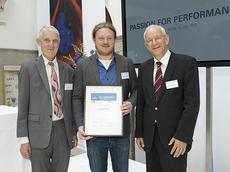Extraordinary researcher honoured
This year’s Rössler Prize has been awarded to Olivier Voinnet, Professor of RNA Biology in the Department of Biology, ETH Zurich. The Frenchman receives the CHF 200,000 research prize for his groundbreaking discoveries in the field of molecular and cell biology.

In 1990, scientists introduced a gene known to stimulate the production of flower pigments into petunia flowers to enhance their colour. However, the genetically modified plants turned practically white. The newly introduced genes not only failed to be expressed, but they also suppressed the naturally present one.
This mysterious inactivation of genes, later found to rely on species of very small, non-coding RNA molecules, is now regarded as one of the most fundamental discoveries of modern biology. The function and applications of what are now known as small interfering RNAs, or siRNAs, have since become integral to biological research and applied medicine. However, many aspects of this new class of RNA molecules and their biological effects, collectively referred to as ‘RNA interference,’ or RNAi, remain unexplored.
Spotlight on a young field of research
Olivier Voinnet, 41, worked on this group of molecules as a PhD student and discovered how plants use RNAi to defend themselves against viral infection. Since the siRNAs originate from the virus itself, plants can use them specifically against the pathogen, in a sequence-specific manner. In 1997, Voinnet was able to demonstrate that RNAi can spread throughout the whole plant to confer immunity against the triggering viruses and that, as a counterdefense, viruses evolve proteins that suppress RNAi. A year later, researchers Andrew Fire and Craig Mellow discovered a similar mechanism in the nematode C.elegans, for which they were awarded the Nobel Prize in 2006.
Over the last 15 years, Voinnet has been one of the influential figures in the field of RNAi. For his achievements, he has now been awarded the CHF 200,000 Rössler Prize from ETH Zurich. “I am pleased that once again we can recognise a passionate, committed researcher. Voinnet’s exciting discoveries reflect his contagious enthusiasm for research,” says Ralph Eichler, President of ETH Zurich.
Every cent going into research
The scientist aims to invest the prize money in persuing his recent discovery that RNAi has antiviral roles in mammalian cells, as it does in plants or invertebrates. “I am extremely grateful for the first-class infrastructure provided and the highly stimulating research environment at ETH Zurich,” says the biologist. The donor and ETH mathematician, Max Rössler, is impressed by the high-tech laboratories that Voinnet has established over the past two years at ETH. “I can see that my money fosters an extraordinary talent and will make a contribution to advancing research.”
The Rössler Prize is a further highlight in Voinnet’s research career. He studied molecular and cellular biology at the Université Pierre et Marie Curie in Paris until 1994, and wrote his engineering diploma thesis in agronomy at the Institut National Agronomique Paris-Grignon (Agro Paristech) in 1996. After his diploma, he moved to England for his postgraduate studies, and in 2001 obtained his doctorate at the Sainsbury Laboratory in Norwich under the tutelage of Sir David Baulcombe. He then obtained an independent group leader position thereafter at the CNRS in Strasbourg and was promoted to Directeur de Recherche in 2005. Voinnet was appointed as a full professor at ETH Zurich in 2010, where he holds the chair of RNA Biology.
Voinnet has a well-established reputation as a leading figure in RNA biology and has received many awards and accolades for his work. He also applied successfully for both the ERC Starting Grant and the ERC Advanced Grant, which he received this year. He has been the youngest person ever to be awarded the EMBO Gold Medal in 2009, one of Europe’s most prestigious research awards for talented young researchers.








READER COMMENTS